Journal of Southern Medical University ›› 2025, Vol. 45 ›› Issue (10): 2135-2145.doi: 10.12122/j.issn.1673-4254.2025.10.10
Xiangzhuo MIAO1( ), Pengyu ZHU1(
), Pengyu ZHU1( ), Huohui OU1,4, Qing ZHU1, Linyuan YU1, Baitang GUO1, Wei LIAO5, Yu HUANG2, Leyang XIANG3(
), Huohui OU1,4, Qing ZHU1, Linyuan YU1, Baitang GUO1, Wei LIAO5, Yu HUANG2, Leyang XIANG3( ), Dinghua YANG1(
), Dinghua YANG1( )
)
Received:2025-03-25
Online:2025-10-20
Published:2025-10-24
Contact:
Leyang XIANG, Dinghua YANG
E-mail:u201712361@163.com;zpy0511@126.com;xly1991@jnu.edu.cn;yangdinghua@smu.edu.cn
Supported by:Xiangzhuo MIAO, Pengyu ZHU, Huohui OU, Qing ZHU, Linyuan YU, Baitang GUO, Wei LIAO, Yu HUANG, Leyang XIANG, Dinghua YANG. Overexpression of parathyroid hormone-like hormone facilitates hepatocellular carcinoma progression and correlates with adverse outcomes[J]. Journal of Southern Medical University, 2025, 45(10): 2135-2145.
Add to citation manager EndNote|Ris|BibTeX
URL: https://www.j-smu.com/EN/10.12122/j.issn.1673-4254.2025.10.10
| R package name | Description and Function |
|---|---|
| survival | Used for survival analysis |
| survminer | Used for drawing survival curves |
| ggplot2 | Used for drawing graphs or data graphics |
| pheatmap | Used for drawing heatmaps |
| limma | Used for difference analysis between groups |
| ggpubr | Extension of the ggplot2 package |
| dplyr | Simplify data processing |
| stringr | String manipulation package |
| forestplot | Draw forest plots |
| reshape | Functions for changing array shapes |
| data.table | Extended R's data frame objects |
Tab.2 R packages used in the analysis
| R package name | Description and Function |
|---|---|
| survival | Used for survival analysis |
| survminer | Used for drawing survival curves |
| ggplot2 | Used for drawing graphs or data graphics |
| pheatmap | Used for drawing heatmaps |
| limma | Used for difference analysis between groups |
| ggpubr | Extension of the ggplot2 package |
| dplyr | Simplify data processing |
| stringr | String manipulation package |
| forestplot | Draw forest plots |
| reshape | Functions for changing array shapes |
| data.table | Extended R's data frame objects |
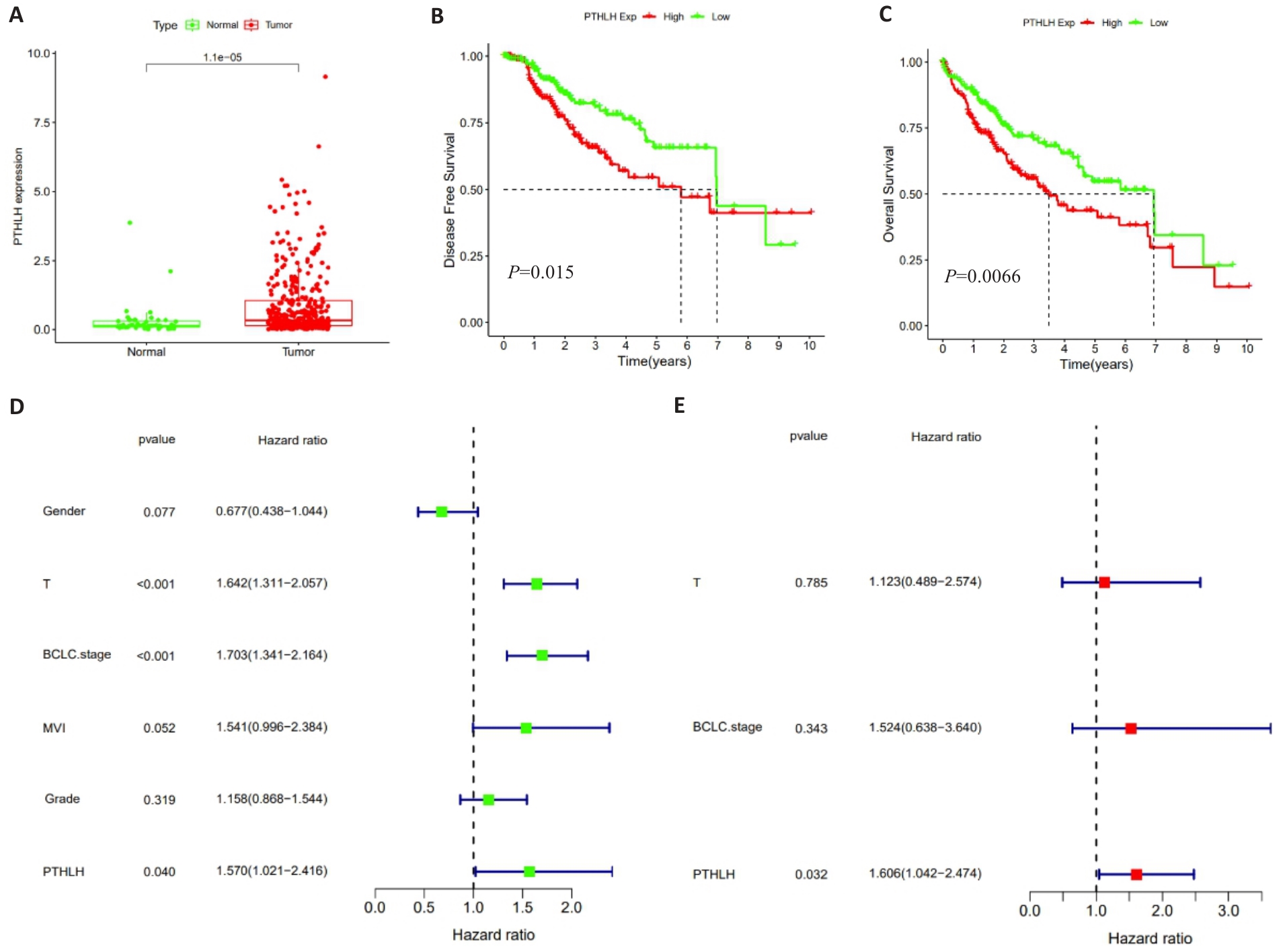
Fig.1 Analysis of PTHLH mRNA expression levels and prognostic evaluation of HCC patients based on data from the TCGA database. A: Comparison of PTHLH mRNA expression levels between HCC and adjacent normal tissues. B: Kaplan-Meier curves for disease-free survival (DFS) stratified by the median expression level of PTHLH mRNA. C: Kaplan-Meier curves for overall survival (OS) stratified by the median expression level of PTHLH mRNA. D: Forest plot of univariate Cox regression analysis. E: Forest plot of multivariate Cox regression analysis.
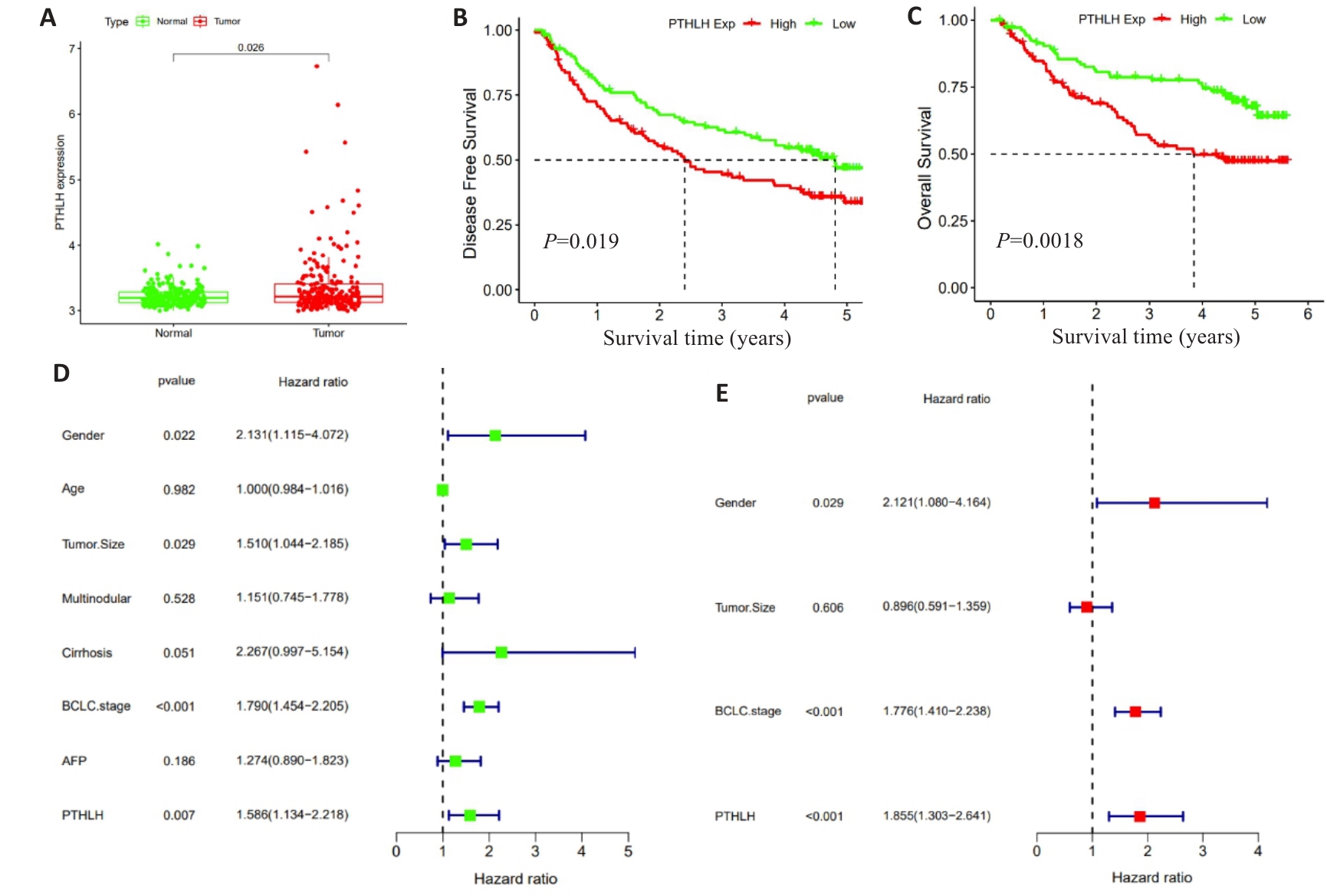
Fig.2 Analysis of PTHLH mRNA expression levels and prognostic evaluation of HCC patients based on data from the GEO database. A: Comparison of PTHLH mRNA expression levels between HCC and adjacent normal tissues. B: Kaplan-Meier curves for DFS of HCC patients stratified by the median expression level of PTHLH mRNA. C: Kaplan-Meier curves for OS of HCC patients stratified by the median expression level of PTHLH mRNA. D: Forest plot of univariate Cox regression analysis. E: Forest plot of multivariate Cox regression analysis.
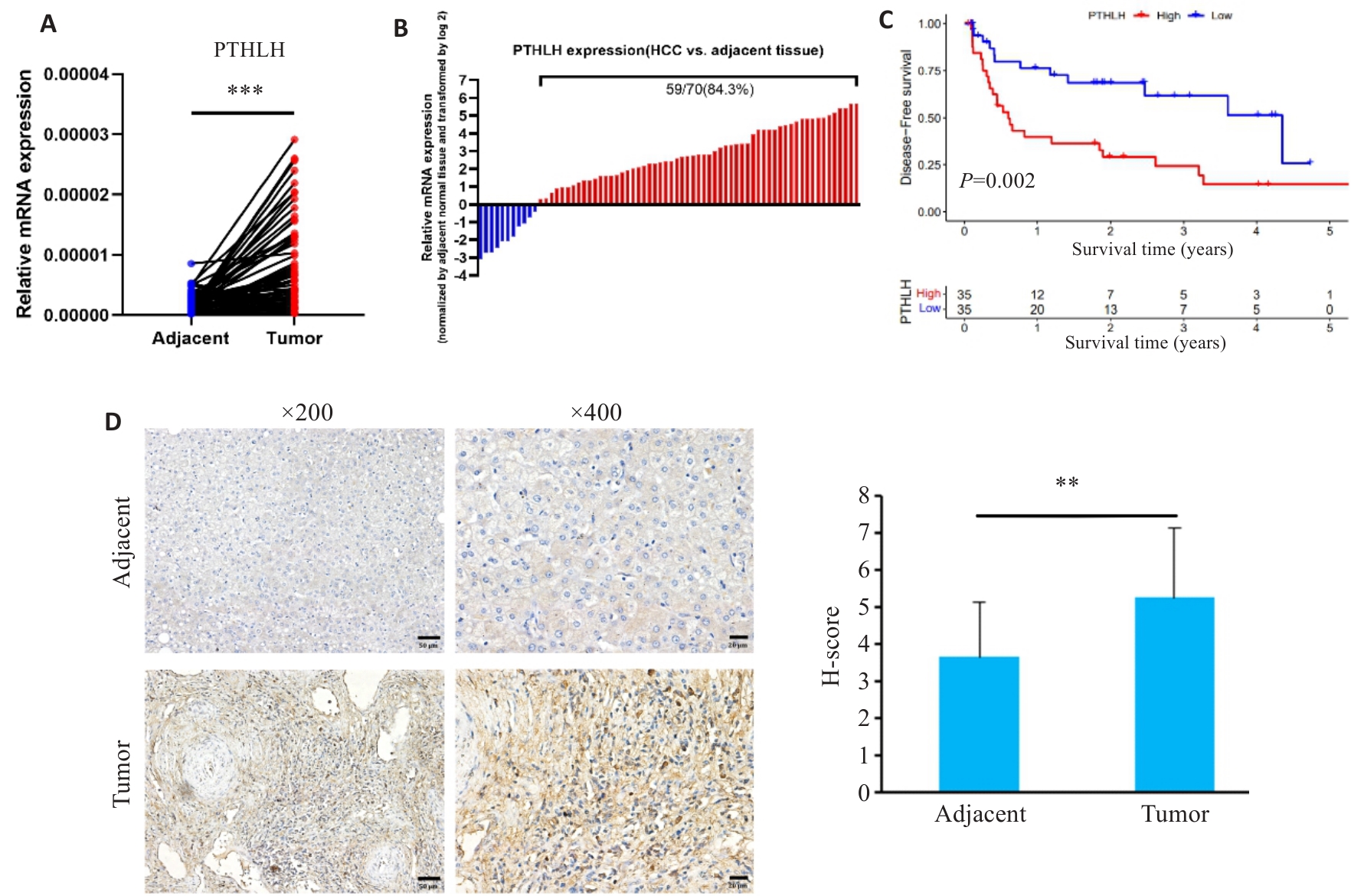
Fig.3 Expression and prognostic analysis of PTHLH in clinical HCC tissue samples. A, B: Relative PTHLH mRNA expression levels in 70 pairs of HCC and adjacent normal tissues. C: Kaplan-Meier curves for DFS of the patients stratified by the median expression level of PTHLH mRNA. D: Representative immunohistochemical staining of PTHLH in HCC and adjacent normal tissues (Scale bar=50 μm). **P<0.01, ***P<0.001.
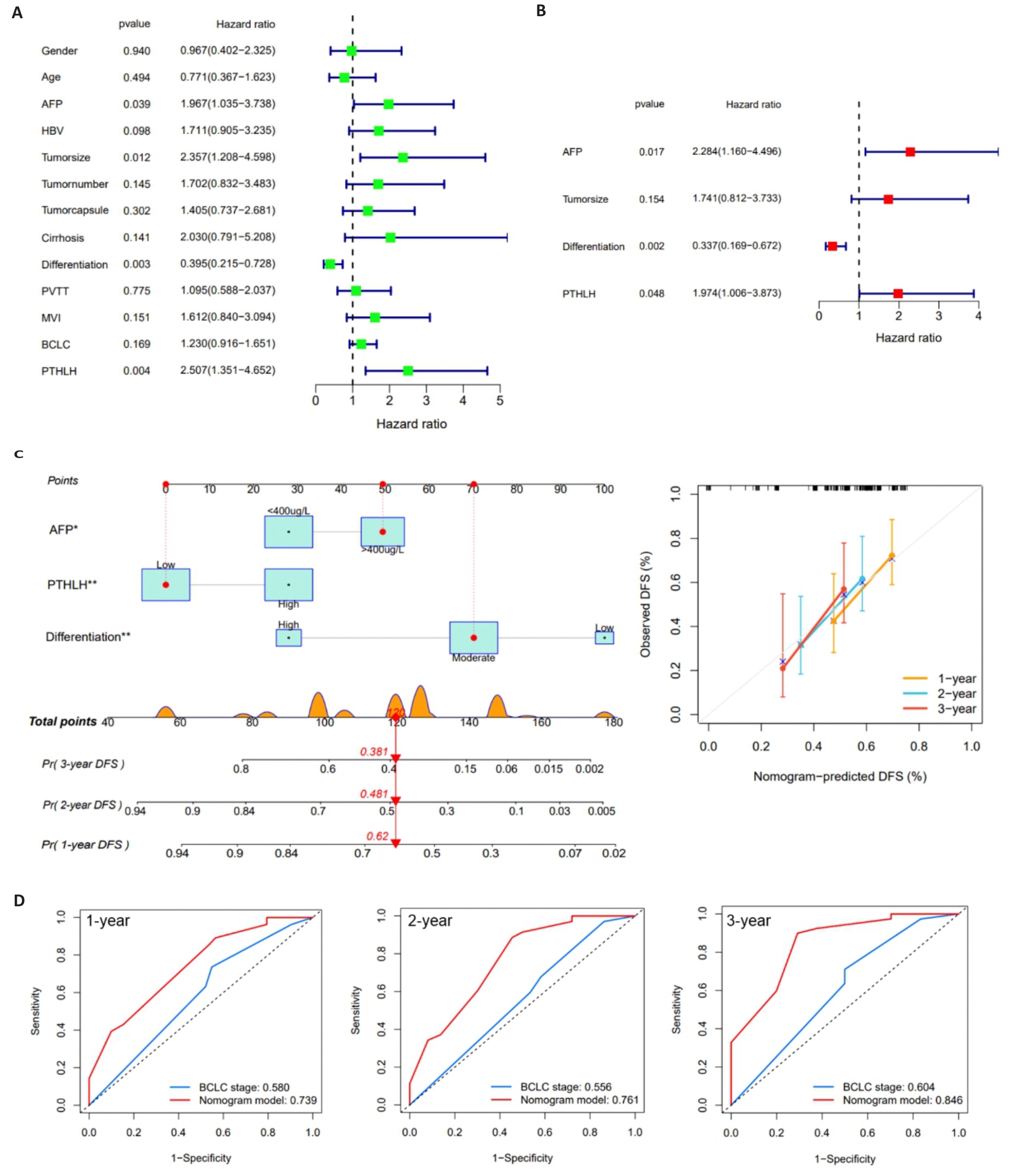
Fig.4 Clinical prognostic value of PTHLH in HCC patients. A: Forest plot of univariate Cox regression analysis. B: Forest plot of multivariate Cox regression analysis. C: Nomogram for predicting 1-year, 2-year, and 3-year DFS in HCC patients. D: ROC curves comparing the predictive performance of the PTHLH-based nomogram and BCLC staging system.
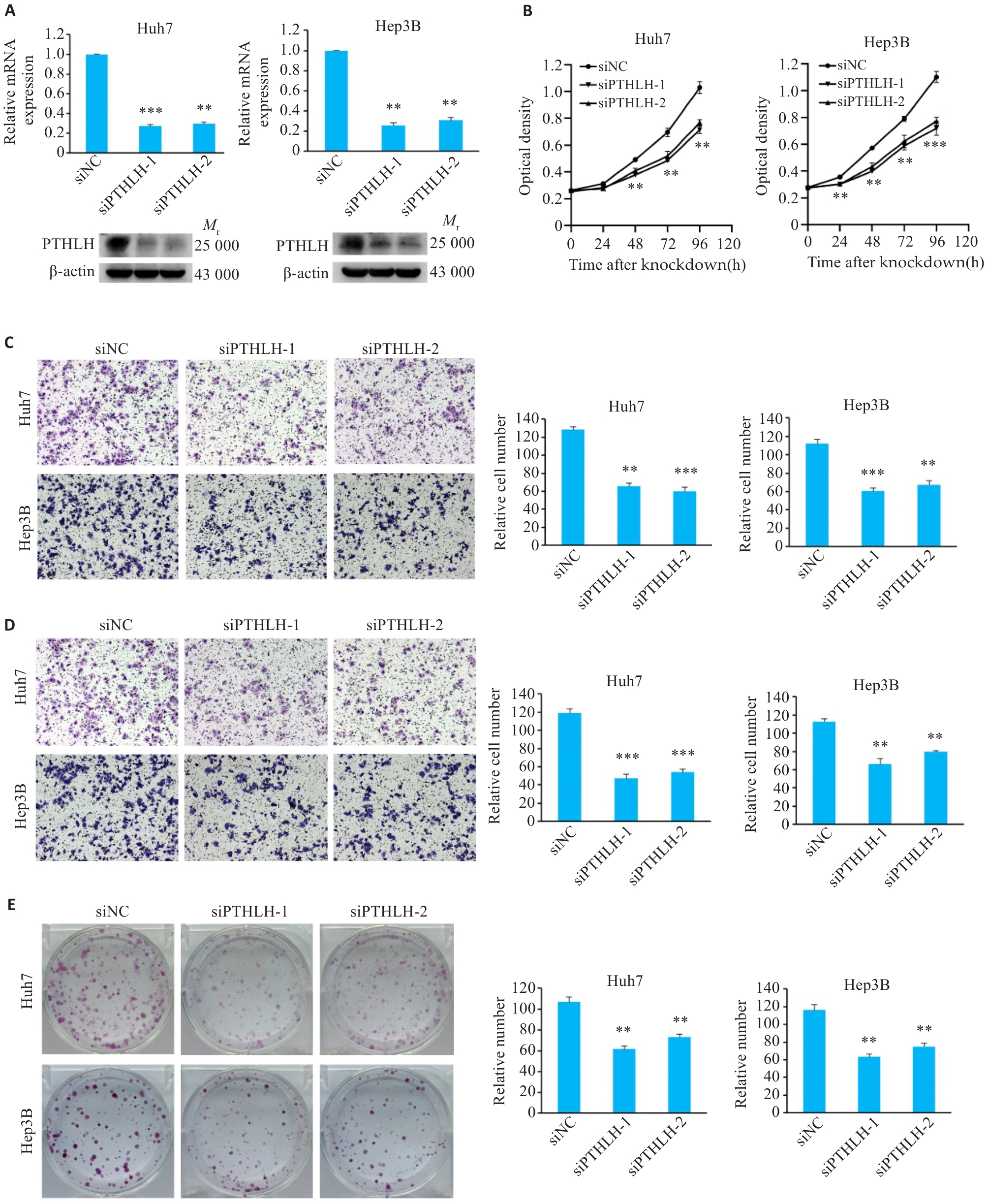
Fig.5 Knockdown of PTHLH suppresses malignant phenotypes of HCC cells. A: Validation of PTHLH knockdown efficiency by qRT-PCR and Western blotting. B: CCK-8 assay showing cell proliferation. C: Transwell migration assay results (Original magnification: ×100). D: Matrigel invasion assay results (×100). E: Colony formation assay results. **P<0.01, ***P<0.001 vs control group (siNC).
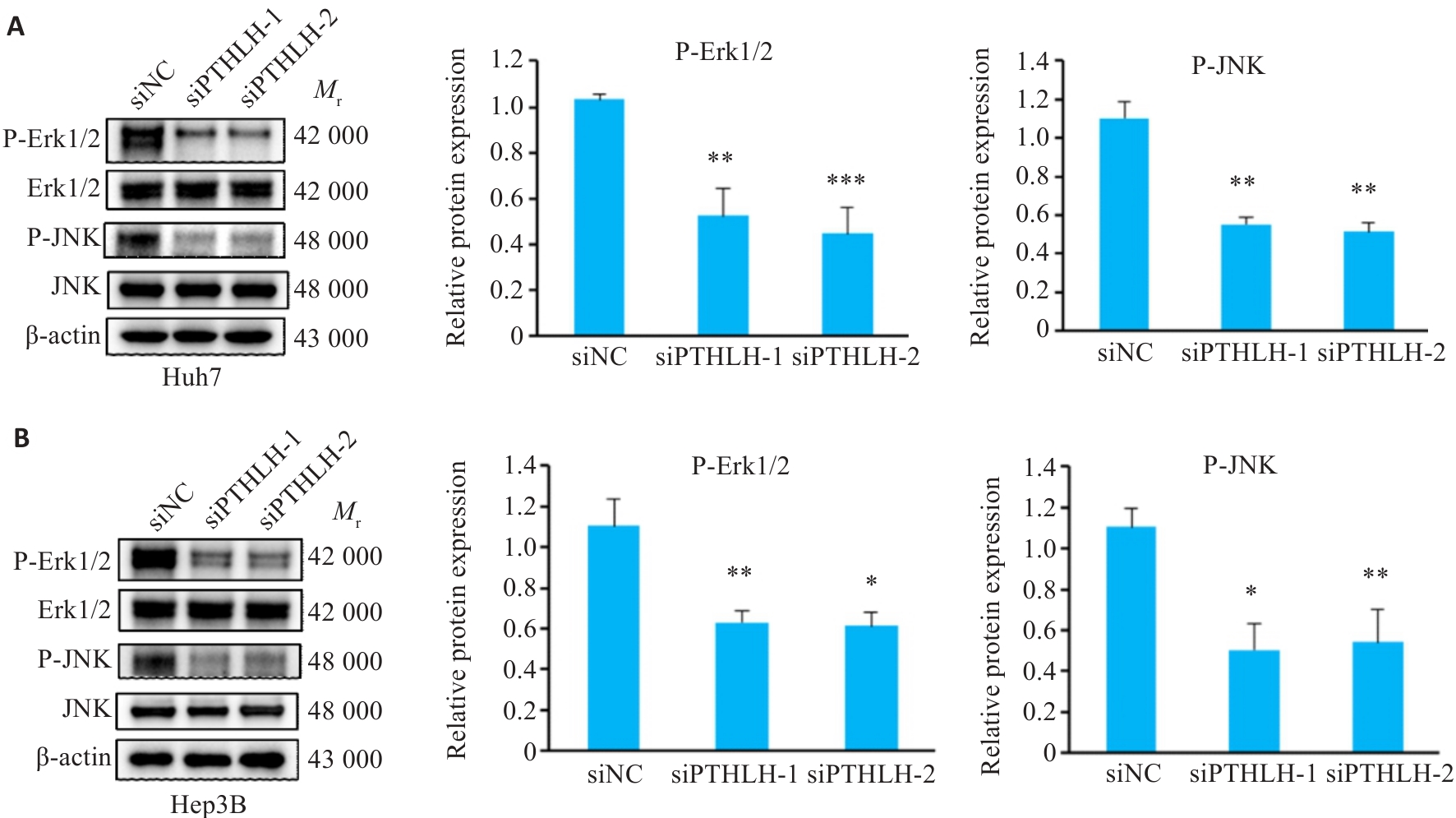
Fig.6 Analysis of ERK/JNK signaling pathway in HCC cells by Western blotting following PTHLH knockdown. A: Western blotting of the ERK/JNK signaling pathway in Huh7 cells. B:Western blotting of the ERK/JNK signaling pathway in Hep3B cells. *P<0.05, **P<0.01, ***P<0.001 vs siNC.
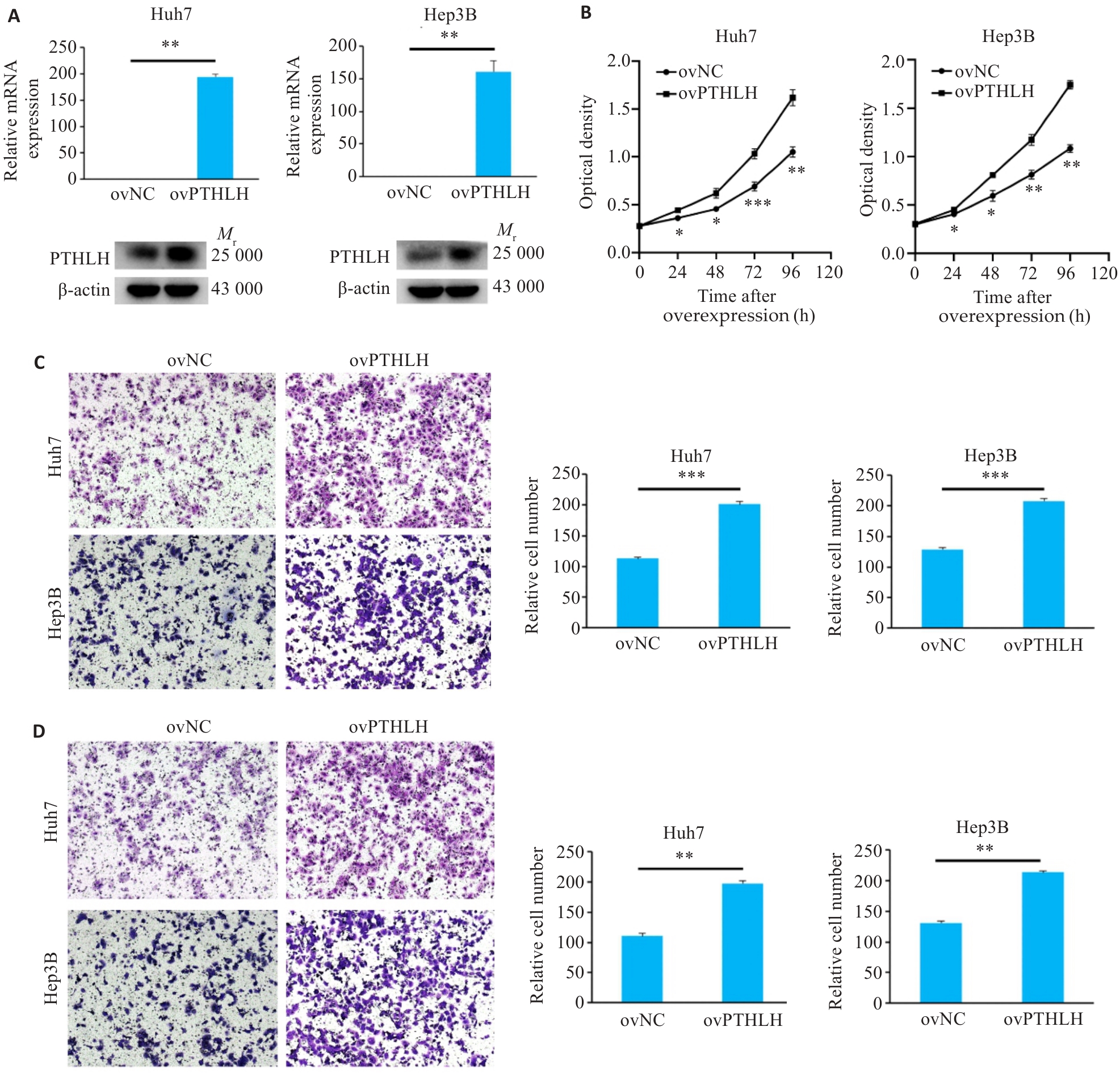
Fig.7 Overexpression of PTHLH enhances malignant phenotypes of HCC cells. A: Validation of PTHLH overexpression efficiency by qRT-PCR and Western blotting. B: CCK-8 assay showing cell proliferation. C: Transwell migration assay results (×100). D: Matrigel invasion assay results (×100). *P<0.05, **P<0.01, ***P<0.001 vs ovNC.
| [1] | Sung H, Ferlay J, Siegel RL, et al. Global cancer statistics 2020: GLOBOCAN estimates of incidence and mortality worldwide for 36 cancers in 185 countries[J]. CA Cancer J Clin, 2021, 71(3): 209-49. doi:10.3322/caac.21660 |
| [2] | Llovet JM, Kelley RK, Villanueva A, et al. Hepatocellular carcinoma[J]. Nat Rev Dis Primers, 2021, 7: 6. doi:10.1038/s41572-020-00240-3 |
| [3] | Villanueva A. Hepatocellular carcinoma. reply[J]. N Engl J Med, 2019, 381(1): e2. doi:10.1056/nejmc1906565 |
| [4] | Zeng HM, Chen WQ, Zheng RS, et al. Changing cancer survival in China during 2003-15: a pooled analysis of 17 population-based cancer registries[J]. Lancet Glob Health, 2018, 6(5): e555-67. doi:10.1016/s2214-109x(18)30127-x |
| [5] | Clemens TL, Cormier S, Eichinger A, et al. Parathyroid hormone-related protein and its receptors: nuclear functions and roles in the renal and cardiovascular systems, the placental trophoblasts and the pancreatic islets[J]. Br J Pharmacol, 2001, 134(6): 1113-36. doi:10.1038/sj.bjp.0704378 |
| [6] | Srisuwarn P, Disthabanchong S. Role of parathyroid hormone and parathyroid hormone-related protein in protein-energy malnutrition[J]. Front Biosci (Landmark Ed), 2023, 28(8): 167. doi:10.31083/j.fbl2808167 |
| [7] | Strid H, Care A, Jansson T, et al. Parathyroid hormone-related peptide (38-94) amide stimulates ATP-dependent calcium transport in the Basal plasma membrane of the human syncytiotrophoblast[J]. J Endocrinol, 2002, 175(2): 517-24. doi:10.1677/joe.0.1750517 |
| [8] | Grinman DY, Boras-Granic K, Takyar FM, et al. PTHrP induces STAT5 activation, secretory differentiation and accelerates mammary tumor development[J]. Breast Cancer Res, 2022, 24(1): 30. doi:10.1186/s13058-022-01523-1 |
| [9] | Pitarresi JR, Norgard RJ, Chiarella AM, et al. PTHrP drives pancreatic cancer growth and metastasis and reveals a new therapeutic vulnerability[J]. Cancer Discov, 2021, 11(7): 1774-91. |
| [10] | Urosevic J, Garcia-Albéniz X, Planet E, et al. Colon cancer cells colonize the lung from established liver metastases through p38 MAPK signalling and PTHLH[J]. Nat Cell Biol, 2014, 16(7): 685-94. doi:10.1038/ncb2977 |
| [11] | Iddon J, Bundred NJ, Hoyland J, et al. Expression of parathyroid hormone-related protein and its receptor in bone metastases from prostate cancer[J]. J Pathol, 2000, 191(2): 170-4. doi:10.1002/(sici)1096-9896(200006)191:2<170::aid-path620>3.3.co;2-8 |
| [12] | Wang YF, Lei R, Zhuang XQ, et al. DLC1-dependent parathyroid hormone-like hormone inhibition suppresses breast cancer bone metastasis[J]. J Clin Invest, 2014, 124(4): 1646-59. doi:10.1172/jci71812 |
| [13] | Tang J, Liao Y, He SY, et al. Autocrine parathyroid hormone-like hormone promotes intrahepatic cholangiocarcinoma cell proliferation via increased ERK/JNK-ATF2-cyclinD1 signaling[J]. J Transl Med, 2017, 15(1): 238. doi:10.1186/s12967-017-1342-1 |
| [14] | Fang YH, Xu YY, Liao W, et al. Multiomics analyses and machine learning of nuclear receptor coactivator 6 reveal its essential role in hepatocellular carcinoma[J]. Cancer Sci, 2023, 114(1): 75-90. doi:10.1111/cas.15577 |
| [15] | Yang Y, Xiao M, Song Y, et al. H-score of 11β-hydroxylase and aldosterone synthase in the histopathological diagnosis of adrenocortical tumors[J]. Endocrine, 2019, 65(3): 683-91. doi:10.1007/s12020-019-02022-8 |
| [16] | McCauley LK, Martin TJ. Twenty-five years of PTHrP progress: from cancer hormone to multifunctional cytokine[J]. J Bone Miner Res, 2012, 27(6): 1231-9. doi:10.1002/jbmr.1617 |
| [17] | Wysolmerski JJ. Parathyroid hormone-related protein: an update[J]. J Clin Endocrinol Metab, 2012, 97(9): 2947-56. doi:10.1210/jc.2012-2142 |
| [18] | Maioli E, Fortino V. The complexity of parathyroid hormone-related proteinsignalling[J]. Cell Mol Life Sci CMLS, 2004, 61(3): 257-62. doi:10.1007/s00018-003-3233-2 |
| [19] | Mangin M, Webb AC, Dreyer BE, et al. Identification of a cDNA encoding a parathyroid hormone-like peptide from a human tumor associated with humoral hypercalcemia of malignancy[J]. Proc Natl Acad Sci USA, 1988, 85(2): 597-601. doi:10.1073/pnas.85.2.597 |
| [20] | Assaker G, Camirand A, Abdulkarim B, et al. PTHrP, a biomarker for CNS metastasis in triple-negative breast cancer and selection for adjuvant chemotherapy in node-negative disease[J]. JNCI Cancer Spectr, 2019, 4(1): pkz063. doi:10.1093/jncics/pkz063 |
| [21] | Lv ZJ, Wu XB, Cao W, et al. Parathyroid hormone-related protein serves as a prognostic indicator in oral squamous cell carcinoma[J]. J Exp Clin Cancer Res, 2014, 33(1): 100. doi:10.1186/s13046-014-0100-y |
| [22] | Li JR, Karaplis AC, Huang DC, et al. PTHrP drives breast tumor initiation, progression, and metastasis in mice and is a potential therapy target[J]. J Clin Invest, 2011, 121(12): 4655-69. doi:10.1172/jci46134 |
| [23] | Mula RV, Bhatia V, Falzon M. PTHrP promotes colon cancer cell migration and invasion in an integrin α6β4-dependent manner through activation of Rac1[J]. Cancer Lett, 2010, 298(1): 119-27. doi:10.1016/j.canlet.2010.06.009 |
| [24] | Liao JH, Li X, Koh AJ, et al. Tumor expressed PTHrP facilitates prostate cancer-induced osteoblastic lesions[J]. Int J Cancer, 2008, 123(10): 2267-78. doi:10.1002/ijc.23602 |
| [25] | Sourbier C, Massfelder T. Parathyroid hormone-related protein in human renal cell carcinoma[J]. Cancer Lett, 2006, 240(2): 170-82. doi:10.1016/j.canlet.2005.08.020 |
| [26] | Hanahan D, Weinberg RA. Hallmarks of cancer: the next generation[J]. Cell, 2011, 144(5): 646-74. doi:10.1016/j.cell.2011.02.013 |
| [27] | Henderson MA, Danks JA, Slavin JL, et al. Parathyroid hormone-related protein localization in breast cancers predict improved prognosis[J]. Cancer Res, 2006, 66(4): 2250-6. doi:10.1158/0008-5472.can-05-2814 |
| [28] | Hastings RH, Montgrain PR, Quintana R, et al. Cell cycle actions of parathyroid hormone-related protein in non-small cell lung carcinoma[J]. Am J Physiol Lung Cell Mol Physiol, 2009, 297(4): L578-85. doi:10.1152/ajplung.90560.2008 |
| [29] | He SY, Tang J, Diao N, et al. Parathyroid hormone-related protein activates HSCs via hedgehog signalling during liver fibrosis development[J]. Artif Cells Nanomed Biotechnol, 2019, 47(1): 1984-94. doi:10.1080/21691401.2019.1615931 |
| [30] | Wang L, Huang JX, Jiang MH, et al. Inhibited PTHLH downstream leukocyte adhesion-mediated protein amino acid N-linked glyco-sylation coupling Notch and JAK-STAT cascade to iron-sulfur cluster assembly-induced aging network in no-tumor hepatitis/cirrhotic tissues (HBV or HCV infection) by systems-theoretical analysis[J]. Integr Biol (Camb), 2012, 4(10): 1256-62. doi:10.1039/c2ib20148h |
| [31] | Huang JX, Wang L, Jiang MH, et al. PTHLH coupling upstream negative regulation of fatty acid biosynthesis and Wnt receptor signal to downstream peptidase activity-induced apoptosis network in human hepatocellular carcinoma by systems-theoretical analysis[J]. J Recept Signal Transduct Res, 2012, 32(5): 250-6. doi:10.3109/10799893.2012.700717 |
| [32] | Kang N, Zhang XN, Liu K, et al. Roles of ERK/JNK in carbon black induced AP-1 cell signaling pathway changes[J]. J Hyg Res, 2021, 50(4): 533-8. |
| [33] | Zhang ZY, Yang ZH, Wang S, et al. Targeting MAPK-ERK/JNK pathway: a potential intervention mechanism of myocardial fibrosis in heart failure[J]. Biomed Pharmacother, 2024, 173: 116413. doi:10.1016/j.biopha.2024.116413 |
| [34] | Qiu QW, Yu XF, Chen QL, et al. Sema3A inactivates the ERK/JNK signalling pathways to alleviate inflammation and oxidative stress in lipopolysaccharide-stimulated rat endothelial cells and lung tissues[J]. Autoimmunity, 2023, 56(1): 2200908. doi:10.1080/08916934.2023.2200908 |
| [1] | Zhihui FENG, Wenyue LI, Mingxiu ZHANG, Peipei WANG, Yangyang SHUAI, Hong ZHANG. Long noncoding RNA HClnc1 promotes proliferation and migration of liver cancer cells by targeting RBBP5/KAT2B complex to enhance ODC1 transcription [J]. Journal of Southern Medical University, 2025, 45(9): 1919-1926. |
| [2] | Kang WANG, Haibin LI, Jing YU, Yuan MENG, Hongli ZHANG. High expression of ELFN1 is a prognostic biomarker and promotes proliferation and metastasis of colorectal cancer cells [J]. Journal of Southern Medical University, 2025, 45(7): 1543-1553. |
| [3] | Tianli SONG, Yimin WANG, Tong SUN, Xu LIU, Sheng HUANG, Yun RAN. Zheng Gan Decoction inhibits diethylnitrosamine-induced hepatocellular carcinoma in rats by activating the Hippo/YAP signaling pathway [J]. Journal of Southern Medical University, 2025, 45(4): 799-809. |
| [4] | Zhi GAO, Ao WU, Zhongxiang HU, Peiyang SUN. Bioinformatics analysis of oxidative stress and immune infiltration in rheumatoid arthritis [J]. Journal of Southern Medical University, 2025, 45(4): 862-870. |
| [5] | Jinhua ZOU, Hui WANG, Dongyan ZHANG. SLC1A5 overexpression accelerates progression of hepatocellular carcinoma by promoting M2 polarization of macrophages [J]. Journal of Southern Medical University, 2025, 45(2): 269-284. |
| [6] | Meng XU, Lina CHEN, Jinyu WU, Lili LIU, Mei SHI, Hao ZHOU, Guoliang ZHANG. Mechanism of Hedyotis diffusa-Scutellaria barbata D. Don for treatment of primary liver cancer: analysis with network pharmacology, molecular docking and in vitro validation [J]. Journal of Southern Medical University, 2025, 45(1): 80-89. |
| [7] | Liping ZHANG, Xijuan LIU, Xiao HU, Jiali WANG, Xihe YU, Guoliang LI, Haimin YOU, Qizhou ZHANG, Haibo ZHANG. Efficacy and safety of transcatheter arterial chemoembolization followed by hepatic arterial infusion chemotherapy combined with TKI and PD-1 inhibitors as first-line treatment for advanced hepatocellular carcinoma [J]. Journal of Southern Medical University, 2024, 44(9): 1831-1838. |
| [8] | Qianyi CHEN, Shuhan SHANG, Huan LU, Sisi LI, Zhimian SUN, Xirui FAN, Zhilin QI. Calenduloside E inhibits hepatocellular carcinoma cell proliferation and migration by down-regulating GPX4 and SLC7A11 expression through the autophagy pathway [J]. Journal of Southern Medical University, 2024, 44(7): 1327-1335. |
| [9] | Huaxing HE, Lulin LIU, Yingyin LIU, Nachuan CHEN, Suxia SUN. Sodium butyrate and sorafenib synergistically inhibit hepatocellular carcinoma cells possibly by inducing ferroptosis through inhibiting YAP [J]. Journal of Southern Medical University, 2024, 44(7): 1425-1430. |
| [10] | Lili CHEN, Tianyu WU, Ming ZHANG, Zixia DING, Yan ZHANG, Yiqing YANG, Jiaqian ZHENG, Xiaonan ZHANG. Identification of potential biomarkers and immunoregulatory mechanisms of rheumatoid arthritis based on multichip co-analysis of GEO database [J]. Journal of Southern Medical University, 2024, 44(6): 1098-1108. |
| [11] | Pengcheng LIU, Lijuan LOU, Xia LIU, Jian WANG, Ying JIANG. A risk scoring model based on M2 macrophage-related genes for predicting prognosis of HBV-related hepatocellular carcinoma [J]. Journal of Southern Medical University, 2024, 44(5): 827-840. |
| [12] | CHEN Hao, LI Zhenhan, WANG Mingting, LU Linming, TANG Qianli, LUO Liangping. High expression of UBE2S promotes progression of hepatocellular carcinoma by increasing cancer cell stemness [J]. Journal of Southern Medical University, 2024, 44(3): 455-464. |
| [13] | ZHONG Weixiong, LIANG Fangrong, YANG Ruimeng, ZHEN Xin. Prediction of microvascular invasion in hepatocellular carcinoma based on multi-phase dynamic enhanced CT radiomics feature and multi-classifier hierarchical fusion model [J]. Journal of Southern Medical University, 2024, 44(2): 260-269. |
| [14] | Jiawei HU, Fang DU, Lu DING, Luxiang WANG, Weifeng ZHAO. Risk assessment of hepatocellular carcinoma in patients with hepatitis B-related cirrhosis and hypertension: a propensity score matching-based retrospective cohort study [J]. Journal of Southern Medical University, 2024, 44(11): 2243-2249. |
| [15] | Wen ZHAO, Hejing RUAN, Siyuan WANG, Yuzhe CHENG, Miao LEI, Jiufa ZHAO, Chuanmiao LIU. Inhibiting Yes-associated protein alleviates CCl4 liver fibrosis in mice by reducing epithelial mesenchymal transition [J]. Journal of Southern Medical University, 2024, 44(10): 1839-1849. |
| Viewed | ||||||
|
Full text |
|
|||||
|
Abstract |
|
|||||